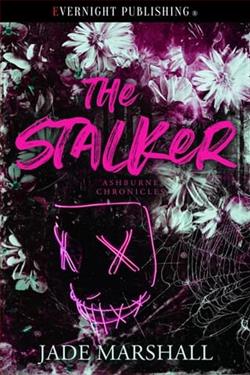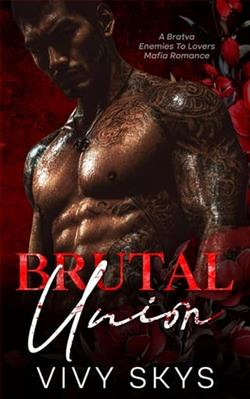Page 86 of The Hallmarked Man
‘No, definitely not.’
‘You were all agreed William Wright was Jason Knowles, weren’t you?’ said Robin. ‘Everyone who worked at the shop, I mean?’
‘Oh, yes,’ said Pamela. ‘Yes, it was definitely Knowles. Well, it made perfect sense. He’d spotted an opportunity. The security at Ramsays…’
‘The cameras look very old,’ said Robin.
‘Old?’ said Pamela, with resurgent scorn. ‘Bullen & Co replaced those models nay on twenty years ago, and the outside one hasn’t worked in all the tayme they’ve owned the shop. Kenneth never got round to fixing it. Thought just thesaytof it would be a deterrent.’
‘Right,’ said Robin. As she returned Fleetwood’s photo to her handbag, she said,
‘Mr Ramsay mentioned a funny email that had been sent from the shop, a week before the robbery. To a man named Calvin “Oz” Osgood? Saying they could help him with a problem?’
‘Yes, Wrayght sent it,’ said Pamela at once. ‘Well, it certainly wasn’tme, and Kenneth didn’t do it. Nayther of us had ever heard of the man.’
‘What about Jim Todd?’ asked Robin.
‘He shouldn’t have had the password to the computer,’ said Pamela. ‘Aycertainly never gave it to him.’
‘Mrs Bullen-Driscoll, this has been so helpful,’ said Robin warmly, getting to her feet. ‘I really do hope the problems with your eyes get better.’
‘Thank you,’ said Pamela, also standing up. ‘You’ve been… very kaynd.’
Ten minutes later, Robin was standing alone beside the entrance to Chancery Lane Tube station, her mobile clamped to one ear, a finger in her other, and a broad smile on her face.
‘Ellacott,’ said Strike’s voice, audible even over the roar of the surrounding traffic, ‘you’re a fucking marvel.’
25
‘We’ll all be rich before we die yet.’
‘Depends when we die,’ growled Tom – in which observation – obvious as it was – there was undoubtedly much truth.
John Oxenham
A Maid of the Silver Sea
Strike’s trip to Ipswich yielded a small amount of further information about the friend of Plug’s whom Kim had identified as an ex-embezzler. According to a neighbour who’d emerged from her house with a Red Setter, and with whom Strike struck up a conversation by pretending to be a great dog lover, Plug’s friend had been prosecuted under the Animal Cruelty Act and banned from keeping any domestic pet for five years.
‘Disgusting,’ the neighbour told Strike, scowling in the direction of the man’s overgrown front garden. ‘I think you should get a lifetime ban on keeping pets if you’re prosecuted for cruelty. What he did to that lurcher… I’ve got no time for people who mistreat animals. They should have the same done back to them, if you ask me.’
While driving back to London that evening, Strike wondered whether animal cruelty formed any part of whatever business was driving Plug and his associates’ discreet exchanges of cash. On arriving home he made an anonymous call to the RSPCA, tipping off the animal welfare charity that a large animal or animals appeared to be incarcerated without fresh air or sunlight in Plug’s padlocked shed. That, he hoped, might flush out something interesting.
As he left the office, he noticed that Pat’s aquarium had now acquired three inhabitants, and stopped to look at them. Theseweren’t goldfish as he recognised them. Indeed, one of them, which was black, appeared to him to be so misshapen he wondered whether it wasn’t diseased, having what looked like a knobbly growth on its head, a lumpy body and a distinctly waddling action. Propped against the base of the tank was a card on which was written in Pat’s handwriting ‘DO NOT FEED I’VE ALREADY DONE IT’, an instruction with which Strike was more than happy to comply. He left, turning out the light.
His plan for the following day was to trace Larry McGee, the delivery man who’d been fired from Gibsons at some point after delivering the Murdoch silver. Strike set out for the auction house after breakfast, planning to pretend he didn’t know McGee had been sacked, and hoping to wring details of his dismissal from whoever he could manage to talk to.
A woman was standing on the corner of Denmark Street and Charing Cross Road as Strike approached it. Alert as he was for the possibility of journalistic interest after Culpepper’s story, Strike eyed her as he drew nearer, but discounted the idea that she worked for the papers. She was a well-built young woman with white-blonde hair extensions; as he drew nearer, he saw false eyelashes and plumped-up lips, and the figure revealed by the tightly belted coat showed evidence of cosmetic enhancement too, reminding him of Bijou Watkins, who’d also had large breast implants. The blonde bowed her head and hunched her shoulders as Strike passed her, but he suspected this was due less to any wish to preserve her incognito than a workaday wish not to be importuned by a random male, which he suspected might happen to her quite frequently.
Half an hour later, Strike arrived at Gibsons Auction House, which was situated in an elegant Edwardian building on Northumberland Avenue. Tasteful gold Christmas lights had been fixed around the edge of a large window, where a pair of abstract paintings were hung on almost invisible strings. A man as tall as Strike, who was wearing an immaculate black suit and had a goatee and a shaven head, stood guard outside the door.
‘Morning,’ said Strike, pulling a card out of his wallet and showing it to the security man. ‘I’m hoping to talk to Larry McGee.’
‘You’ll be lucky,’ said the man.
‘Why’s that?’
‘He’s dead, mate.’















